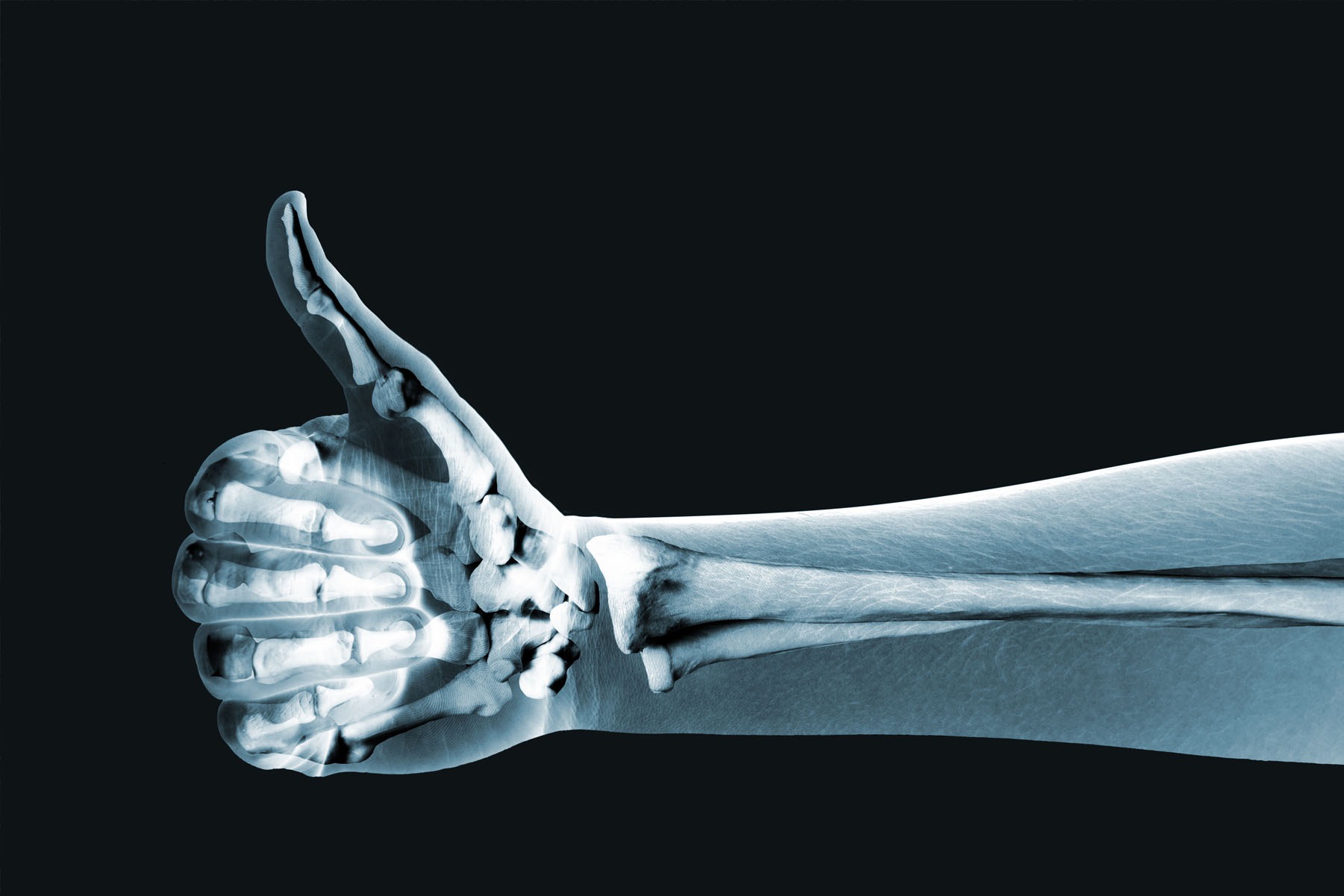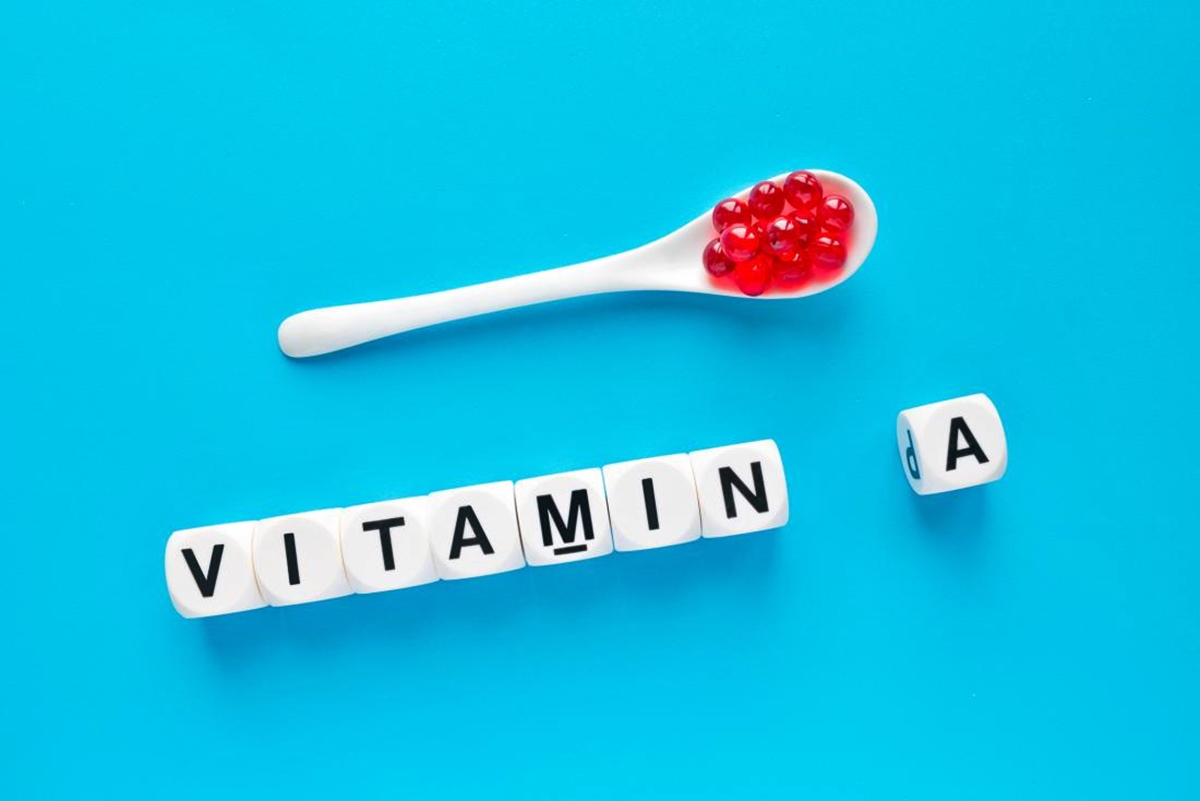

Featured
What Vitamins Are Good For Bone Health
Published: September 3, 2023
Discover the top featured vitamins for optimal bone health and learn how they can support your overall well-being. Enhance your skeletal strength with these essential nutrients.
Introduction
Bone health is a crucial aspect of overall well-being. Strong and healthy bones are essential for proper mobility, stability, and overall quality of life. However, as we age, our bones may become more susceptible to conditions such as osteoporosis, which can lead to increased risk of fractures and decreased quality of life.
Fortunately, there are several vitamins that play a crucial role in maintaining and improving bone health. These vitamins have been extensively researched and proven to be beneficial for supporting bone strength and density. In this article, we will explore the top vitamins that are good for bone health and discuss their specific benefits.
It’s important to note that although vitamins are an important part of maintaining bone health, they are not a substitute for a well-rounded and balanced diet. A healthy lifestyle that includes regular exercise, a nutrient-rich diet, and other positive habits is crucial for optimal bone health.
Now, let’s dive into the world of vitamins and discover how they can contribute to maintaining strong and healthy bones throughout life.
Importance of Bone Health
Bone health is of utmost importance for individuals of all ages. Strong and healthy bones provide the structural support necessary for daily activities, protect vital organs, and help prevent fractures and injuries. Additionally, good bone health is crucial in preventing osteoporosis, a common condition characterized by low bone mass and increased risk of fractures.
Throughout our lives, our bones undergo a process called remodeling, where old bone tissue is broken down and replaced with new bone tissue. This process is regulated by various factors, including hormones, physical activity, and nutrition. Adequate nutrition, specifically the intake of essential vitamins, plays a key role in supporting optimal bone health.
As we age, our bodies may become less efficient at absorbing and utilizing nutrients, making it even more important to prioritize a balanced and nutrient-rich diet that includes the vitamins necessary for bone health. Proper nutrition can help slow down bone loss, maintain bone density, and reduce the risk of fractures.
Furthermore, maintaining strong and healthy bones is not only vital for physical health but also for overall well-being. Fractures and injuries associated with poor bone health can significantly impact a person’s independence, mobility, and quality of life. By prioritizing bone health and ensuring adequate vitamin intake, individuals can mitigate the risk of developing bone-related conditions and maintain an active and fulfilling lifestyle.
Now that we understand the importance of bone health, let’s explore the specific vitamins that play a critical role in supporting and maintaining strong bones.
Vitamin D and Bone Health
Vitamin D is often referred to as the “sunshine vitamin” because our bodies can produce it when our skin is exposed to sunlight. This essential vitamin plays a crucial role in maintaining bone health by enhancing calcium absorption in the intestines and facilitating its incorporation into the bones.
Calcium is a key mineral for bone strength and density. However, without sufficient amounts of vitamin D, the body cannot effectively absorb and utilize calcium, leading to weakened bones and an increased risk of fractures.
In addition to promoting calcium absorption, vitamin D also regulates the levels of calcium and phosphorus in the blood, which are essential minerals for bone health. It helps in the formation of osteoblasts, cells responsible for bone formation, and supports the function of osteoclasts, cells that break down old bone tissue.
Furthermore, research suggests that vitamin D deficiency may be associated with a higher risk of osteoporosis, as well as other conditions such as rickets in children and osteomalacia in adults. These conditions can result in weakened bones, bone pain, and an increased susceptibility to fractures.
Sources of vitamin D include sunlight, fatty fish (e.g., salmon, mackerel), fortified dairy products, egg yolks, and mushrooms. However, for individuals who have limited sun exposure or dietary restrictions, it may be beneficial to supplement with vitamin D under the guidance of a healthcare professional.
It’s important to note that excessive intake of vitamin D can be harmful. It is recommended to follow the recommended daily intake guidelines and consult with a healthcare professional if considering supplementation.
Ensuring adequate levels of vitamin D is essential for maintaining optimal bone health and reducing the risk of bone-related conditions. Pairing a balanced diet with regular exposure to sunlight or doctor-recommended supplementation can help support healthy bones throughout life.
Vitamin K and Bone Health
Vitamin K is a group of fat-soluble vitamins that play a vital role in bone health by regulating calcium metabolism and promoting proper bone mineralization.
There are two main forms of vitamin K: vitamin K1 (phylloquinone) and vitamin K2 (menaquinone). Vitamin K1 is primarily found in leafy green vegetables, such as spinach and kale, while vitamin K2 is synthesized by bacteria in the gut and is also found in certain animal products and fermented foods.
Vitamin K works by activating proteins that are involved in the regulation of calcium, such as osteocalcin and matrix Gla protein (MGP). Osteocalcin is responsible for mineralizing the bone matrix, ensuring proper bone formation and strength. Without adequate vitamin K, osteocalcin remains inactive and calcium cannot be properly deposited into the bone tissue.
Furthermore, vitamin K also helps prevent the accumulation of calcium in blood vessels and soft tissues, which can contribute to cardiovascular diseases and other health issues. By regulating calcium distribution, vitamin K supports not only bone health but also overall cardiovascular health.
Research has shown that adequate vitamin K intake is associated with increased bone mineral density and reduced risk of fractures. A study published in the Journal of Bone and Mineral Research found that higher vitamin K intake was linked to a lower risk of hip fractures in postmenopausal women.
Incorporating vitamin K-rich foods into the diet is a simple and effective way to support bone health. Leafy green vegetables, such as kale, spinach, and broccoli, are excellent sources of vitamin K1. Additionally, fermented foods like natto and cheese contain vitamin K2.
It’s worth noting that individuals taking blood-thinning medications like warfarin (Coumadin) should consult with their healthcare provider before increasing their vitamin K intake, as vitamin K can interfere with the medication’s effectiveness.
By including vitamin K-rich foods in our diet, we can optimize bone health and reduce the risk of bone-related conditions. Pairing vitamin K with other essential nutrients and a healthy lifestyle can help support strong and healthy bones throughout life.
Calcium and Bone Health
Calcium is perhaps the most well-known and important mineral for maintaining optimal bone health. It is responsible for building and maintaining strong bones and teeth, but it also plays a vital role in other bodily functions, such as muscle contraction and nerve transmission.
When it comes to bone health, calcium works hand in hand with other essential nutrients, including vitamin D and magnesium. Vitamin D helps the body absorb calcium from the intestines and deliver it to the bones, while magnesium is involved in the activation of vitamin D and the conversion of vitamin D into its active form.
It is important to note that the body cannot produce calcium on its own, so it relies on the diet to obtain an adequate supply. Dairy products, such as milk, cheese, and yogurt, are well-known sources of calcium. However, if you’re lactose intolerant, vegan, or following a plant-based diet, there are plenty of non-dairy sources of calcium as well.
Some non-dairy sources of calcium include leafy green vegetables like kale and broccoli, fortified plant-based milk, almonds, sesame seeds, and canned fish with bones. Calcium supplements are also an option for individuals who are unable to meet their calcium needs through diet alone.
Adequate calcium intake throughout life is crucial to support optimal bone health, especially during childhood and adolescence when bone growth is at its peak. However, it’s important to note that excessive calcium intake, especially from supplements, may increase the risk of certain health issues. It’s best to follow the recommended daily allowances and consult with a healthcare professional if considering calcium supplementation.
Additionally, it’s important to maintain a balance between calcium intake and other essential nutrients. Consuming adequate magnesium is important as it can help the body properly utilize calcium and prevent calcium buildup in soft tissues.
By incorporating calcium-rich foods into your diet and maintaining a balanced approach to nutrition, you can support strong and healthy bones throughout life and reduce the risk of osteoporosis and other bone-related conditions.
Magnesium and Bone Health
Magnesium is a mineral that plays a crucial role in maintaining bone health. It is involved in various processes that contribute to the formation, growth, and maintenance of strong and healthy bones.
Magnesium works together with calcium and vitamin D to support bone health. It helps in the activation of vitamin D, which is essential for calcium absorption. Without adequate magnesium levels, the body may struggle to properly utilize and regulate calcium, leading to weakened bone density and increased risk of fractures.
In addition, magnesium plays a role in converting vitamin D into its active form, which is necessary for optimal calcium metabolism. It also stimulates the secretion of the hormone calcitonin, which facilitates the transport of calcium from the blood into the bones, helping to maintain proper bone density.
Research has shown that low magnesium intake is associated with decreased bone mineral density and increased risk of osteoporosis. A study published in the American Journal of Clinical Nutrition found that women with higher magnesium intake had significantly higher bone mineral density.
Good food sources of magnesium include leafy green vegetables, such as spinach and kale, nuts and seeds, whole grains, legumes, and fish. Incorporating these foods into your diet can help ensure an adequate intake of magnesium for optimal bone health.
It’s important to note that excessive intake of magnesium through supplements may have adverse effects and should be avoided unless recommended by a healthcare professional. Balance is key, and it’s always best to strive for a well-rounded diet that includes a variety of nutrients necessary for overall bone health.
By including magnesium-rich foods in your diet and ensuring proper calcium and vitamin D intake, you can support strong and healthy bones throughout life. Prioritizing a balanced approach to nutrition and maintaining an active lifestyle will contribute to optimal bone health and reduce the risk of bone-related conditions.
Vitamin C and Bone Health
Vitamin C, also known as ascorbic acid, is often associated with its immune-boosting properties. However, this essential vitamin also plays a crucial role in maintaining and promoting bone health.
Vitamin C is necessary for the production of collagen, a protein that forms the structural framework of bones. Collagen provides the necessary strength and flexibility to bones, which helps to prevent fractures and maintain overall bone integrity.
In addition to collagen synthesis, vitamin C is involved in the formation of osteoblasts, which are cells responsible for bone formation. It also helps in the absorption of calcium and other essential minerals necessary for bone health.
Studies have shown that vitamin C deficiency can lead to weakened bones and an increased risk of bone fractures. Conversely, adequate vitamin C intake has been associated with higher bone mineral density and reduced risk of osteoporosis.
Fruits and vegetables are excellent sources of vitamin C. Citrus fruits like oranges and grapefruits, berries, kiwi, bell peppers, broccoli, and leafy greens are all rich in vitamin C. Including these foods in your diet can help ensure an adequate intake of vitamin C for optimal bone health.
It’s important to note that vitamin C is water-soluble, which means it is not stored in the body. To maintain consistent vitamin C levels, it’s important to consume a variety of fruits and vegetables regularly.
While vitamin C is important for bone health, it’s also essential to maintain a well-rounded and balanced diet that includes other nutrients necessary for bone health, such as calcium, vitamin D, and magnesium.
By incorporating vitamin C-rich foods into your diet and ensuring overall nutrient adequacy, you can support strong and healthy bones throughout life. Maintaining a healthy lifestyle that includes regular physical activity and avoidance of smoking and excessive alcohol consumption will further contribute to optimal bone health.
Vitamin B12 and Bone Health
Vitamin B12, also known as cobalamin, is well-known for its role in supporting nervous system function and red blood cell production. However, vitamin B12 also plays a vital role in maintaining bone health.
Vitamin B12 is involved in the process of bone remodeling, where old bone tissue is broken down and replaced by new bone tissue. It helps in the synthesis of osteoblasts, the cells responsible for bone formation.
Research suggests that vitamin B12 deficiency may be associated with an increased risk of osteoporosis and decreased bone mineral density. A study published in the Journal of Bone and Mineral Research found that individuals with lower vitamin B12 levels had a higher risk of hip fractures.
Furthermore, vitamin B12 works in conjunction with other nutrients, such as calcium and vitamin D, to support bone health. Adequate levels of vitamin B12 are necessary for proper calcium absorption and utilization in the bones.
Vitamin B12 is predominantly found in animal-based foods, including meat, fish, eggs, and dairy products. For individuals following a vegetarian or vegan diet, plant-based sources of vitamin B12, such as fortified cereals and nutritional yeast, can be consumed to ensure an adequate intake.
Older adults, individuals with gastrointestinal disorders, and strict vegetarians or vegans may be at a higher risk of vitamin B12 deficiency. In these cases, supplementation may be necessary under the guidance of a healthcare professional.
It’s important to note that vitamin B12 works synergistically with other nutrients, and maintaining overall nutrient adequacy through a well-balanced diet is crucial for optimal bone health.
By including vitamin B12-rich foods or supplements in your diet and ensuring adequate intake of other essential nutrients, you can support strong and healthy bones. Regular physical activity, avoidance of smoking, and moderation in alcohol consumption also contribute to maintaining optimal bone health.
Vitamin A and Bone Health
Vitamin A is a fat-soluble vitamin that plays a crucial role in maintaining overall health, including bone health. While it is often associated with its role in vision, vitamin A also contributes to the growth, development, and maintenance of strong and healthy bones.
Vitamin A is involved in bone remodeling, the process in which old bone tissue is broken down and replaced by new bone tissue. It aids in the formation of osteoblasts, the cells responsible for bone formation. Adequate levels of vitamin A are essential for proper bone growth and development, particularly during childhood and adolescence.
In addition to its role in bone formation, vitamin A also supports the absorption and utilization of calcium, a mineral essential for bone strength and density. It enhances the expression of calcium-binding proteins, which are crucial for calcium transport and incorporation into the bones.
Foods rich in vitamin A include various colorful fruits and vegetables, particularly those that are orange or red in color. Examples include carrots, sweet potatoes, spinach, kale, apricots, and bell peppers. Animal-based sources of vitamin A include liver, dairy products, and fish.
It’s important to note that excessive intake of vitamin A, particularly in the form of supplements, can be toxic. Therefore, it’s recommended to obtain vitamin A through a well-balanced diet rather than relying on supplements, unless specifically advised by a healthcare professional.
While vitamin A is important for bone health, it’s essential to maintain a well-rounded and balanced diet that includes other nutrients necessary for bone health, such as calcium, vitamin D, and magnesium.
By incorporating vitamin A-rich foods into your diet and ensuring overall nutrient adequacy, you can support strong and healthy bones throughout life. Pairing a healthy diet with regular exercise and other bone-strengthening activities will further contribute to optimal bone health.
Vitamin E and Bone Health
Vitamin E, a powerful antioxidant, is commonly known for its role in supporting immune function and protecting against oxidative stress. However, emerging research suggests that vitamin E may also play a role in promoting optimal bone health.
The antioxidant properties of vitamin E help to protect bone cells from oxidative damage, which can lead to bone remodeling imbalance and weakened bone structure. By neutralizing free radicals, vitamin E helps maintain the integrity of bone tissue and supports overall bone health.
Furthermore, vitamin E may also have a role in reducing inflammation in bone tissue. Chronic inflammation can have a negative impact on bone health, contributing to conditions like osteoporosis. Vitamin E’s anti-inflammatory properties may help minimize inflammation in bone tissue and improve bone health.
Some studies have suggested a potential association between higher vitamin E intake and increased bone mineral density. A study published in the American Journal of Clinical Nutrition found that women with higher vitamin E intake had a lower risk of hip fractures.
Vitamin E can be obtained from a variety of food sources, including nuts and seeds (such as almonds and sunflower seeds), vegetable oils (such as wheat germ oil and sunflower oil), and green leafy vegetables (such as spinach and kale). Including these vitamin E-rich foods in your diet can help support bone health.
It’s worth noting that excessive intake of vitamin E through supplements may have adverse effects and should be approached with caution. It’s best to strive for a well-rounded diet that includes a variety of nutrients necessary for overall bone health.
While vitamin E alone is not a magic solution for bone health, it is an important nutrient that, when combined with other essential vitamins, minerals, and a healthy lifestyle, can contribute to overall bone health and reduce the risk of bone-related conditions.
Conclusion
Maintaining strong and healthy bones is essential for overall well-being and quality of life. Adequate nutrition, including the intake of essential vitamins, plays a crucial role in supporting optimal bone health.
In this article, we explored various vitamins that are beneficial for bone health. Vitamin D is necessary for calcium absorption and regulation, while vitamin K supports proper bone mineralization. Calcium is crucial for bone strength, and magnesium aids in calcium utilization. Vitamin C is involved in collagen synthesis, and vitamin B12 contributes to bone remodeling. Additionally, vitamin A and vitamin E both play important roles in supporting bone health.
While vitamins are important for bone health, they should be obtained through a balanced and nutrient-rich diet. Including a variety of fruits, vegetables, whole grains, lean proteins, and healthy fats can help ensure an adequate intake of essential vitamins and minerals.
It’s important to note that individual needs may vary, and consulting with a healthcare professional or registered dietitian can provide personalized guidance on nutrient requirements and supplementation, if necessary. Additionally, maintaining an active lifestyle, avoiding smoking, and limiting alcohol consumption further contribute to optimal bone health.
By prioritizing bone health and incorporating these vitamins into a well-rounded diet, individuals can support strong and healthy bones throughout life and reduce the risk of bone-related conditions such as osteoporosis and fractures.
So, let’s make bone health a priority and give our bodies the nutrients they need for a solid foundation to support optimal bone health and overall well-being.









